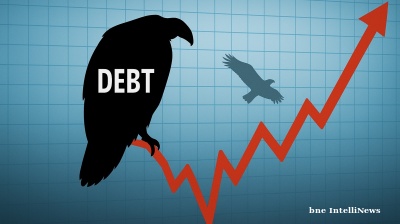Ukraine got off to a very good start this year and by the middle of the year bne IntelliNews was arguing in an op-ed that the country had grasped the nettle and was at least in control of the majority of its most serious problems.
Since then, everything has rapidly fallen apart and now Ukraine is facing the prospect of a debilitating currency and debt crisis in the second half of next year, as it doesn't have the resources to deal with $11bn of debt that matures in the third quarter of 2021, Elina Ribakova, deputy chief economist with the Institute of International Finance (IIF) and Evghenia Sleptsova, senior economist for Russia and the CIS of Oxford Economics told bne IntelliNews in a recent podcast (listen here, watch here).
“It's a typical Ukraine story: two steps forward, one step backwards,” says Sleptsova.
“I was going to use exactly the same words, except to say actually we are in a phase now where it's more like: one step forward, two steps backwards,” Ribakova added.
OK for now
Ukraine is ok for now. It has $26.6bn in gross international reserves (GIR), which is equivalent to 4.4 months of import cover – more than the minimum needed to maintain the stability of the hryvnia, which is trading at UAH28.4 to the dollar as of November 25.
And it has met most of its debt repayment obligations for this year, with another c.$3bn due in the first quarter of next year and c.$1.5bn in the second quarter. All in all, Ukraine has a total of $14.5bn of debt to redeem in 2021.
At a pinch the government can finance some of that from its reserves without doing too much damage to the exchange rate nor inflation, but not all. The problems start in the third quarter as the debt that was restructured five years ago in the post-EuroMaidan protests that led to the change in government comes due.
The other problem is the new 2021 budget is just being finalised and has a 6% of GDP (UAH270bn or $9.5bn) deficit as the government spends heavily on stimuli to repair the damage done by the coronacrisis. (Kyiv initially agreed a 4%-5% deficit and the final amount remains the object of discussion.) Without a working IMF programme the state is going to struggle fund this deficit.
Ukraine was plunged into a political crisis after the Constitutional Court nixed several anti-corruption laws, including criminal liability from lying on an annual mandatory income e-declaration that all public employees are required to fill in that was implemented at the insistence of the IMF as one of the strings attached to Ukraine’s $5bn Stand-by Agreement (SBA). As a result, the IMF programme has been de facto suspended. Ukraine had already received $2.1bn in June from the IMF, but it is now clear that the next tranche of $700mn due now has not, and will not, arrive before the end of the year.
“With the budget still under consideration in the Verkhovna Rada (second reading in early December), we no longer expect any IMF disbursements before the end of the year,” says Ribakova.
As a result, authorities will need to rely more on domestic financing of the fiscal deficit. Ukraine has had some luck: the current account is looking good thanks to falling oil prices and remittances have held up surprisingly well, with a total of about $10bn expected to be sent home from abroad this year by migrant workers.
Next year doesn't look as good
“Considering the significant swing of the current balance to surplus in 2020 ($4.2bn over Q1-Q3), external pressure has declined sharply, and upcoming debt amortisation can be met from reserves. We believe that Ukraine will be able to continue to muddle through over the coming months. However, the situation will likely become untenable over the medium term, compelling the country to return to the IMF for support,” adds Ribakova.


The current account is likely to remain balanced next year too, but that won’t help Ukraine to pay back its external debt, says Sleptsova. “Funding the external debt payments out of reserves is not an option,” says Sleptsova, who argues that restarting the IMF programme is the only possible scenario.
Ukrainian President Volodymyr Zelenskiy had a “constructive” phone conversation with the IMF managing director Kristalina Georgieva last week and Ukraine’s form on its patchy relationship with the IMF is that the programme regularly gets suspended, but each time the country faces a crisis the government makes concessions and the programme is restarted for a time.

“Without IMF disbursements, related donor funding from the European Union and others, and non-resident inflows into the local debt market, the deficit will be difficult to finance,” says Ribakova.
There is around a total of $10bn on offer from Ukraine’s extended family of international financial institution (IFI) partners and friendly governments, but all of this money is tied to having a working IMF deal in place.
Since the Ukrainian capital market was hooked up to international settlements and payment system Clearstream last April non-resident investors have flooded into the Ukraine’s Ministry of Finance hryvnia-denominated OVDP treasury bills (OVDP) that have proved to be another very useful source of funding for the government. Last year, non-resident investors pumped $4.2bn into the Ukrainian OVDP market, but since February they have been selling.
Foreign investment in Ukrainian government hryvnia bonds has dropped by almost one third since the start of the year, according to the National Bank of Ukraine (NBU). Foreigners currently hold UAH78.6bn, the equivalent of $2.7bn, down 32% since January. The share of non-residents in the market has gone from a peak of 15.7% on St Valentine’s Day this year to 8.3% as of November 25, and appears to be still falling.

The slack has been taken up by the local banks, but Sleptsova says that local banks are almost tapped out and without the non-residents the OVDP is not a viable source of funding.
“Ukrainian banks’ holdings of government debt are already close to an internationally established limit of 35% of the deposit base, suggesting that their ability to absorb any further debt is limited,” says Sleptsova.
Indeed, at the weekly auction on November 24 the Ministry of Finance had to hike yields by 125bp to 10.25% to sell c.$200mn of mostly 5-month notes that was only just enough to roll over maturing debt.
However, the government doesn't seem to have grasped the reality of the situation, as the draft 2021 budget assumes that the majority of the gross funding needs will be financed by issuing more OVDP local currency bonds on the domestic market. The plan is to issue UAH550bn of local debt and UAH86bn of FX bonds, as well as UAH43bn from the IMF. Of this issuance UAH440bn is needed to roll over old debt. That leaves a net issuance of UAH280bn, according to Oxford Economics, but local banks have total liquidity of only UAH200bn, so even if they invested all this money into local bonds it is not enough to cover the government’s funding plans.
One option is for the Ministry of Finance to buy back some of its debt from the banks in a quantitative easing (QE) scheme. But currently the NBU is banned from monetising local debt; nevertheless, the idea is being currency discussed.
Another option is to tap the international capital market with another Eurobond to follow the $2bn bond placed in July. However, again without a functioning IMF deal the cost of borrowing will be higher and Sleptsova says that Ukraine won't be able to issue more than $1.5bn-$2bn in 2021 anyway.
The numbers just don't add up. Sleptsova has calculated that the government will face a $4bn funding gap in 2021 without the IMF money.
Out of the total planned budget deficit of UAH300bn (about $10bn) for 2020, the government managed to raise only UAH82bn ($3.1bn) in the first nine months of the year, three-quarters from external sources and one-quarter from the domestic market.
“The government will still need to raise at least $5.8bn (UAH156bn) until the end of the year. This is likely to prove impossible if the IMF doesn’t resume co-operation, because the local market has no capacity to absorb such issuance,” says Sleptsova. “They might go for some very expensive private “bridge financing” issues in the meantime – they have done this in the past – and that will pass the cost on to the next generation.”
Both analysts believe one of the options the government is toying with is simply turning on the printing presses to cover the domestic spending. This won’t help with settling the external debt, as you cannot pay off dollar loans using hryvnia, but it will allow them to cover the budget deficit without tapping the IMF for more money.
On top of this, the oligarchs have been pushing for a weaker hryvnia of about UAH30 to the dollar. That benefits their export orientated businesses, particularly metallurgy, as many of them own steel mills. Spending reserves to cover the external debt and printing hryvnia will both result in a weaker currency.
But it remains to be seen what will happen. The Ukrainian soap opera continues.

Features

Europe remains Russia's number one biggest importer of gas, top five importer of oil in August
US President Donald Trump complained that the EU is still importing too much Russian oil and that the White House will not put sanctions on Russia unless the EU cuts back on this business.
_1758174730.jpg)
Indonesia’s Raja Ampat - tourism hub or den of corruption?
In recent years, Indonesia has doubled down on promoting Raja Ampat, a remote archipelago in West Papua famed for its biodiversity, as a global eco-tourism icon.

Flood corruption scandal shakes the Philippines
The Philippines is grappling with a widespread controversy surrounding its flood control programme, with allegations of billions of pesos being siphoned off from projects meant to protect vulnerable communities.

The European Commission proposes to “creatively” tap Russia’s $300bn of frozen assets with Reparation Loans
The European Commission is floating a new idea of how to “creatively” tap Russia’s $300bn of frozen assets without the need to appropriate, which is legally questionable, by replacing the money transferred to Kyiv with EU-backed bonds.



